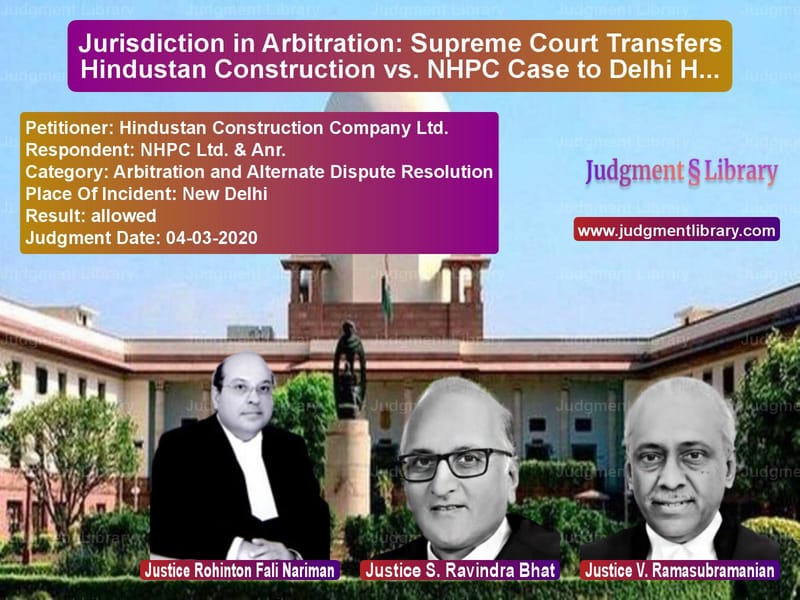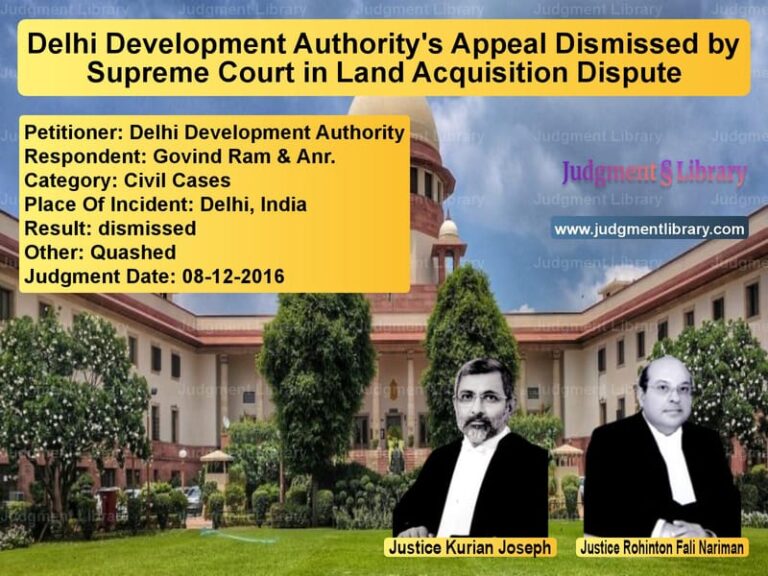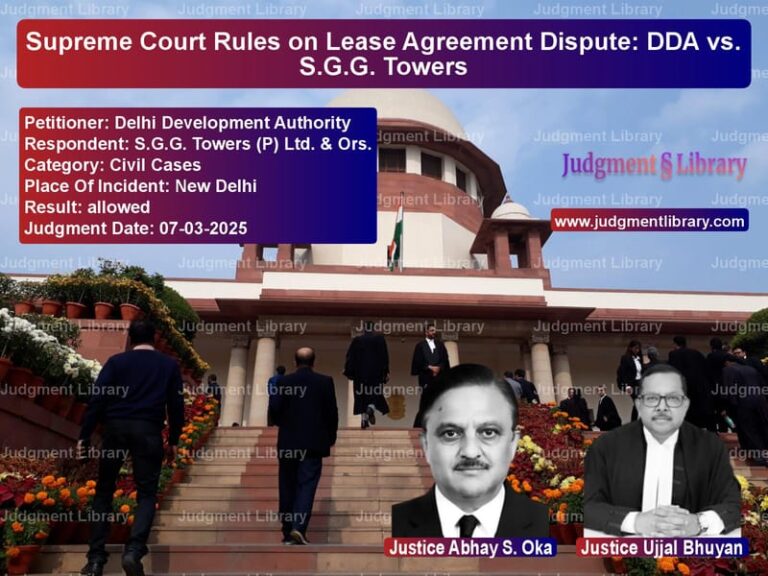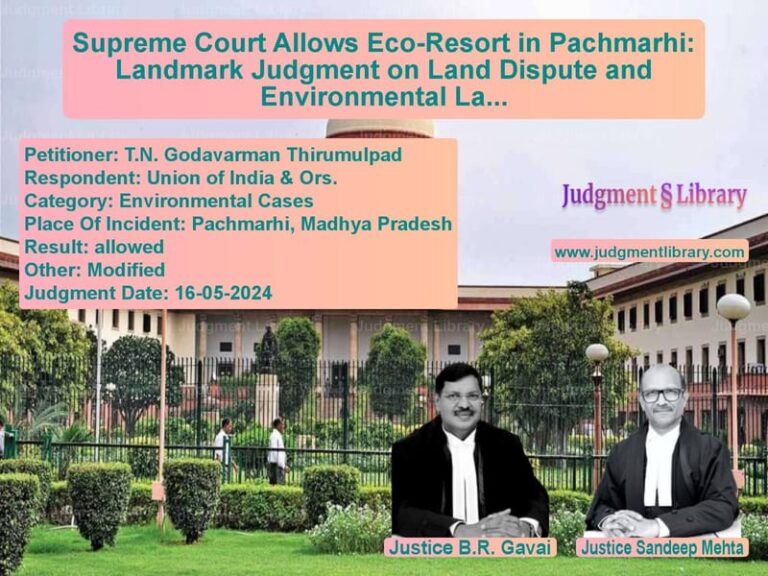Jurisdiction in Arbitration: Supreme Court Transfers Hindustan Construction vs. NHPC Case to Delhi High Court
The Supreme Court of India, in its judgment dated March 4, 2020, resolved a significant jurisdictional dispute in arbitration proceedings, ruling that once an arbitration seat is designated, only the courts of that seat have exclusive jurisdiction over arbitration-related matters. The case involved Hindustan Construction Company Ltd. (HCC) and NHPC Ltd., where the dispute centered around whether Faridabad or New Delhi had jurisdiction over an arbitration challenge under the Arbitration and Conciliation Act, 1996.
Background of the Case
HCC and NHPC entered into an agreement for the execution of a construction contract, which contained an arbitration clause. Following disputes, the arbitration proceedings took place, and the final award was challenged under Section 34 of the Arbitration Act. A key point of contention was the jurisdiction of the court to entertain such a challenge.
Initially, the Additional District Judge-cum-Presiding Judge, Special Commercial Court at Gurugram, ruled that New Delhi was the designated arbitration seat. However, based on the precedent set by Bharat Aluminium Co. v. Kaiser Aluminium Technical Services (2012), the judge found that since the contract was executed in Faridabad and part of the cause of action arose there, Faridabad courts had jurisdiction under Section 42 of the Arbitration Act.
Legal Proceedings
Hindustan Construction Company Ltd.’s Arguments
- HCC contended that since the agreement specified New Delhi as the arbitration seat, only the courts in New Delhi had jurisdiction over arbitration-related matters.
- It relied on the Supreme Court’s ruling in BGS SGS Soma JV v. NHPC Ltd. (2019), which held that when a seat is designated, it functions as an exclusive jurisdiction clause.
- HCC argued that allowing jurisdiction in Faridabad would contradict the arbitration agreement and create conflicting court proceedings.
NHPC Ltd.’s Arguments
- NHPC argued that since the contract was executed in Faridabad and part of the dispute arose there, the Faridabad courts should retain jurisdiction.
- It claimed that the earliest application was filed in the Faridabad court, and under Section 42 of the Arbitration Act, all subsequent proceedings should also be heard there.
- NHPC relied on past rulings that allowed jurisdiction to be shared between different courts where the cause of action arises.
Supreme Court’s Observations
1. Jurisdiction of Courts in Arbitration
The Supreme Court reiterated its position in BGS SGS Soma JV that once a seat of arbitration is designated, it operates as an exclusive jurisdiction clause, eliminating jurisdiction from any other court:
“Once the seat of arbitration is designated, such clause then becomes an exclusive jurisdiction clause as a result of which only the courts where the seat is located would then have jurisdiction to the exclusion of all other courts.”
2. Inapplicability of Section 42
The Court clarified that Section 42, which states that once an application is filed in a court, all subsequent applications must be made in the same court, does not apply when the initial application is made in a court without jurisdiction:
“Given the finding in this case that New Delhi was the chosen seat of the parties, even if an application was first made to the Faridabad Court, that application would be made to a court without jurisdiction.”
3. Confirmation of Exclusive Jurisdiction
The Court reaffirmed that only the Delhi High Court had the jurisdiction to entertain arbitration-related disputes in this case:
“The courts at New Delhi alone would have jurisdiction for the purposes of challenge to the Award.”
Final Verdict
The Supreme Court allowed HCC’s appeal and ordered the transfer of all pending Section 34 applications from the Faridabad Court to the Delhi High Court:
“As a result of this judgment, the Section 34 application that has been filed at Faridabad Court will stand transferred to the High Court of Delhi at New Delhi.”
The Court also allowed NHPC to move for further proceedings under Section 36 of the Arbitration Act in the Delhi High Court.
Implications of the Judgment
- Establishes a clear precedent that once an arbitration seat is designated, it provides exclusive jurisdiction to the courts of that location.
- Prevents conflicting jurisdictional claims that could delay arbitration proceedings.
- Ensures uniformity in the interpretation of arbitration clauses in contracts.
- Strengthens India’s arbitration framework by reinforcing the role of arbitration seats in determining jurisdiction.
Petitioner Name: Hindustan Construction Company Ltd..Respondent Name: NHPC Ltd. & Anr..Judgment By: Justice Rohinton Fali Nariman, Justice S. Ravindra Bhat, Justice V. Ramasubramanian.Place Of Incident: New Delhi.Judgment Date: 04-03-2020.
Don’t miss out on the full details! Download the complete judgment in PDF format below and gain valuable insights instantly!
Download Judgment: Hindustan Constructi vs NHPC Ltd. & Anr. Supreme Court of India Judgment Dated 04-03-2020.pdf
Direct Downlaod Judgment: Direct downlaod this Judgment
See all petitions in Arbitration Awards
See all petitions in Dispute Resolution Mechanisms
See all petitions in Judgment by Rohinton Fali Nariman
See all petitions in Judgment by S Ravindra Bhat
See all petitions in Judgment by V. Ramasubramanian
See all petitions in allowed
See all petitions in supreme court of India judgments March 2020
See all petitions in 2020 judgments
See all posts in Arbitration and Alternate Dispute Resolution Category
See all allowed petitions in Arbitration and Alternate Dispute Resolution Category
See all Dismissed petitions in Arbitration and Alternate Dispute Resolution Category
See all partially allowed petitions in Arbitration and Alternate Dispute Resolution Category







